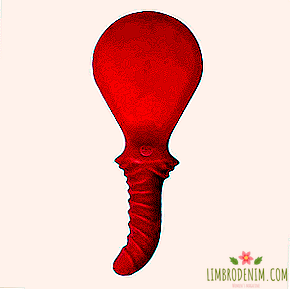The Wizard of Earthsea: How Ursula Le Guin Made Fiction "Serious" Literature
Ursula Le Guin passed away in Oregon on January 22 - one of the greatest writers of our time, poetess, novelist and critic; she was eighty-eight. The most varied authors admitted to the love of her works: Margaret Atwood and Neil Gaiman, J. R. R. Martin and Zadie Smith, Salman Rushdie and David Mitchell - the latter has already written a heartfelt note about his conversations with Le Guin.
Despite the fact that she worked most actively in the 60s, and gained fame as the author of science fiction and fantasy, from the very first books Le Guine fought for the right to be just a writer - in the broad sense of the word. Her role in protecting genre works in front of the world of "serious" literature is enormous: back in 1974, she gave a lecture on "Why Americans are afraid of dragons", and in interviews and journalism she constantly reminded how important the imagination is for a person. and fantasy.

Being a writer in a predominantly "male genre," Le Guin was obviously in a losing position - not only a woman, but also an open feminist. When asked what prizes and regalia meant for her, she always answered that all forms of recognition were important because they were unthinkable until recently for women. Her 1969 novel The Left Hand of Darkness is a milestone in the development of the theory of gender, and a text that has not lost its relevance, perhaps due to a special approach to the construction of worlds. It is he who distinguishes Le Guin's prose from the works of many, if not most fiction writers.
Ursula Kröber was born in 1929 in Berkeley, in the family of the famous anthropologist Alfred Louis Kröber and the writer Theodora Krakau. Before her and her brothers, before her eyes, there were well-read, inquisitive parents: the university professorship, native Americans, refugees, and foreign friends of the family visited the house of the Kroebers. Le Guin herself talked about the fact that such a childhood - a personal acquaintance with the "other", with people who do not look like themselves and live quite differently - gave her a great advantage. This experience and interest in anthropology have united in the work of the writer, in which an integral, interested and respectful description of other cultures plays a huge role.
"The Left Hand of Darkness" is one of the first books in the genre of feminist science fiction, and few works can better show the reader that a world is possible in which gender does not determine your career and destiny.
For Le Guin, both the writer and the man, the diversity of all spheres of human life was incredibly important, which from the very beginning was noticeable in her literature. The inhabitants of the planet Göten from the Left Hand of Darkness is the most famous example of the appeal to androgyny in science fiction. The protagonist of the novel, Jenley Ai, the envoy of Ecumene, an alliance of civilizations, is trying to persuade the planet Goethen to join it. As we study the two titular nations of the planet, their culture, history, mythology, and communication with the politician Estraven Jenley Au, they gradually begin to understand a world in which gender plays no decisive role, since all residents can change it (in those days when generally manifested - the rest of the time residents of Geten bespoly).
Science fiction is often an ethical experiment, the conditions of which the author sets, placing his heroes in the future, an alternative present or on another planet. "The Left Hand of Darkness" is one of the first books in the genre of feminist science fiction, and few works can better show the reader that a world is possible in which gender does not determine your career and destiny.
"The Left Hand of Darkness" has become one of the canonical texts of world fiction and is constantly adjacent to the "Dune" by Frank Herbert in the lists of the best science fiction books of all time. Neighborhood is not surprising, including because environmental problems for Le Guin are no less important than issues of equality and social equality. For many decades she was actively engaged in environmental activities, primarily in the dissemination of information about the detrimental effects of the waste of earthly resources. In the “Left Hand of Darkness”, the climate and the attitude of different nations towards it play a significant role, but in other works of the Hayn cycle this motif appears even brighter. The most famous text of environmental fiction by Le Guin is considered to be the 1976 Word for the Forest and the World.

No less important for the writer and philosophy: in her books the fundamental "light" and "darkness" constantly collide. She studied Taoism and Lao Tse's Book of the Way for more than forty years, and in 1998 she published her translation of the book, made possible through collaboration with Chinese Taoists and researchers of the Tao de Jing. The new English text is less esoteric and written in more modern language, but the translation did not lose the power of the word "dao".
Taoism also played an enormous role in the creation of the second most famous work of the writer - the poetic and philosophical fantasy cycle about Earthsea. The world of Earthsea appeared in Le Guin’s early story “The Rule of Names”, and later became a platform for several more stories and five novels, the first of which is “The Wizard of Earthsea” of 1968 (known in Russian in several translations, but the original was , Helen Solodukhova’s variant “Warlock of the Archipelago”).
The novel about the formation and maturation of the wizard Ged and his way of knowing his own power, strength of language and name has become an inexhaustible source of inspiration for the authors of fantasy and teenage literature - echoes of Earthsea can be heard even in Harry Potter. The Earthsea cycle was conceived precisely as a literature on growing up - despite the fact that there was no such subgenre in the literature of the 60s as “Yang-Adalt”. A new wave of interest in Earthsea came to the release of the film adaptation of the "Wizard" of the famous Studio Ghibli.
Her work doesn’t boil down to one genre: “I’m a novelist and a poet. I don’t have to be driven into a framework I don’t fit in. Because I’m everywhere. My tentacles come out of the hole for pigeons in all directions”
The last finished novel Le Guin was released in 2008. Lavinia is a new look at the part of Virgil's Aeneid. Lavinia is one of the minor heroines, who has practically no voice in the Roman classics, but which becomes the main character in the writer's text. Here the central place is occupied not by the gods and not the battle, but the opposition of the agrarian country and the military conflict that destroys its structure. The fate of Lavinia herself, a semi-mythical, semi-literary character, who in the novel knows about her artistic nature and at the same time lives an eventful life in a detailed recreated historical reality, is subtly meaningful.
This is Le Guin's first novel about the past of the Earth, and it is especially significant that this is about the past of the epic. Virgil at one time took the minor hero of Homer's Iliad and made him the new main character of the new world; Le Guin does the same thing and puts at the forefront a woman - but not a warrior woman who has to show herself on the battlefield, but a woman whose inner world is important enough for a big book. Such a turn of events is not a coincidence, considering that Le Guin herself, being a feminist and participating in the pacifist movement, never suffered from a messianic complex. Above all, she valued her family, her life and the ability to read and write.
In an interview with John Ray from Paris Review, the writer says that science fiction is incredibly important to her, but her work is not limited to this genre: "I am a novelist and a poet. Do not drive me into a framework in which I do not fit. Because I am everywhere My tentacles crawl out of the pigeon hole in all directions. " This touching wordplay ("pigeonhole" in English is both an opening for the departure of pigeons and an unwanted classification frame) and comparing myself with a fantastic monster perfectly show to what extent Le Guin understood her position and did not accept it.
She said that she did not like the idea of progress - not progress itself, but precisely the idea of the world, which seemed to improve every time in all respects and thereby negates the previous "dark ages" without appreciating the other world left behind. She was always close to the Taoist idea of change. In the last year of life, the future of humanity scared it most of all with the current distribution of resources and climate change. But the writer had time to rejoice at the fact that she became a member of the American Academy of Arts and the second author (after Philip Roth), whose collected works during her life began to be published in Library of America - the most important non-commercial publishing house of American classics. These and many other awards, including every conceivable award for fiction and fantasy, showed that Le Guin's path led to great, real changes. And for women writers, and for genre literature.
Photo:Marian Wood Kolisch, Jack Liu





